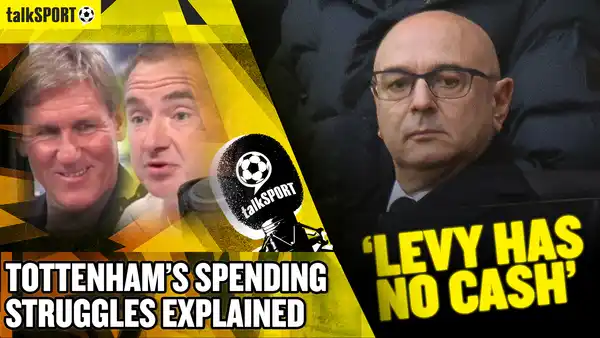The harsh reality of modern football finance has come knocking at Tottenham’s door, with the club facing significant spending constraints ahead of what promises to be a pivotal summer transfer window.
According to football finance expert Stefan Borson, chairman Daniel Levy finds himself in a precarious position – needing to generate funds through player sales or external investment rather than dipping into his own pockets to revitalize Ange Postecoglou’s struggling squad.
This financial squeeze comes at perhaps the worst possible moment for Spurs, currently languishing in 16th position in the Premier League table.
Their dismal domestic campaign has left Europa League success as the only viable path to European football next season – with the added prize of Champions League qualification for the tournament winners offering potential salvation for both sporting ambitions and financial health.
The numbers paint a sobering picture. While Tottenham technically have approximately £200 million available to spend without breaching Profit and Sustainability Rules (PSR), the club faces a cash flow crisis that goes far beyond simple compliance with financial regulations.
Borson reveals the club is already £30-40 million short of their expected revenue projections, having anticipated finishing no lower than seventh in the league. This shortfall could balloon further if they fail to secure any European football for next season, creating what Borson describes as a “huge hole” in next year’s budget.
The financial challenges run deeper than mere accounting. Tottenham face approximately £250 million in outstanding payments for previous transfers, wage commitments, debt servicing, and operational costs. This cash crunch leaves Levy with limited options.

Contrary to popular perception, the Spurs chairman cannot simply inject personal funds to solve the problem. While wealthy through his shareholding, Levy lacks the liquid assets to make a significant capital contribution without selling his stake in the club.
This leaves ENIC’s Lewis Trust as the only potential source of fresh investment, but even this avenue comes with complications. The club’s existing debt covenants may restrict their ability to take on additional borrowing, creating a perfect storm of financial constraints.
As Borson succinctly puts it: “Unless they either raise money from one of their shareholders or sell some footballers, they won’t have the cash to pay for new footballers.”
The path forward requires pragmatic decision-making. Tottenham don’t necessarily need to sell their crown jewels at premium prices – even modest sales could generate the necessary liquidity.
A player like Richarlison, for example, could be moved at a loss from an accounting perspective while still providing vital cash flow. Borson suggests a £20 million sale to Saudi Arabia, while representing a financial loss on paper, would serve the club’s immediate needs without creating PSR complications.
This financial reality check comes as Spurs prepare for their most important match of the season – Thursday’s Europa League semifinal first leg against Bodo/Glimt. Success in the competition could provide both a financial lifeline and a morale boost, potentially opening the door to Champions League revenue that would transform their summer plans.
Failure would leave the club facing difficult choices about which assets to monetize and how to rebuild a squad that has clearly underperformed this campaign.
The situation underscores the delicate balancing act facing modern football clubs. While Tottenham’s new stadium and commercial operations provide strong revenue streams, the combination of on-field struggles and financial commitments has created an unusually constrained environment.
How Levy navigates these challenges – whether through creative player trading, securing new investment, or potentially restructuring the club’s finances – will define Tottenham’s trajectory for years to come.
For Postecoglou, the financial picture adds another layer of complexity to his rebuilding job. The Australian manager may need to be creative in the transfer market, potentially focusing on younger talents or loan deals rather than big-money signings.
The club’s ability to offload underperforming players will be just as crucial as their capacity to bring in new faces.
As the summer approaches, Tottenham find themselves at a crossroads. The decisions made in the coming months – both on and off the pitch – will determine whether this period is remembered as a temporary setback or the beginning of a more prolonged decline.
One thing is certain: in an era of financial fair play and careful fiscal management, even clubs of Tottenham’s stature can no longer spend their way out of trouble. The solutions will need to be smarter, more nuanced, and potentially more painful than in years past.
The next fortnight could prove decisive, with Europa League progress offering potential salvation and failure potentially accelerating the need for difficult decisions.
For Levy and Tottenham’s hierarchy, the challenge is clear: stabilize the finances without compromising the club’s competitive ambitions. It’s a high-wire act that will test every ounce of their footballing and financial acumen.
